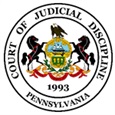Court of Judicial Discipline

The Court of Judicial Discipline of the Commonwealth of Pennsylvania was established by Constitutional amendment adopted on May 18, 1993, and declared in effect by the Governor's Office on Aug. 11, 1993.
The Court of Judicial Discipline has jurisdiction over all judicial officers in Pennsylvania and must hear and decide formal charges which are filed against a judicial officer.
Judicial officers include all magisterial district judges; judges of the Courts of Common Pleas, the Commonwealth Court and the Superior Court; and justices of the Supreme Court. The Court of Judicial Discipline has the authority to impose sanctions, ranging from a reprimand to removal from office, if the formal charges are sustained. The initial members of the Court were appointed during the fall of 1993 and sworn in on Nov. 23, 1993, with terms dating back to Aug. 16, 1993.
Judges of the Court of Judicial Discipline
Judge Charles L. Becker, P.J.
Judge Steven D. Irwin
Judge Carolyn Nichols
Judge John A. Hipple
Judge Erick J. Coolidge
Judge Terrence R. Nealon
Doing Business with the Court
Filing Requirements
Unless otherwise directed by the Court, every filing with the Court requires an original and three copies, except in the case of pleadings in excess of 20 pages, in which case the original and 10 copies are required. All filings shall be filed with the Court of Judicial Discipline clerk of court in the Pennsylvania Judicial Center, 601 Commonwealth Avenue, Suite 5500, Harrisburg, Pennsylvania.
Typical Case Flow Description
The Judicial Conduct Board files a complaint formally charging a judicial officer with misconduct. Charges may be based upon the specific language of Article V, §18(d)(1), or upon conduct prohibited under Article V, §17. When the board files a complaint, the president judge is required to appoint a conference judge within 10 days of service of the complaint. The conference judge is directed to conduct pre-trial hearings, act on pre-trial motions, and certify notice to the president judge that a case is ready for trial.
Once the complaint is filed, the judicial officer has the option, within 30 days of service of the complaint, of filing an omnibus motion, which could raise questions such as the sufficiency of the allegations or the jurisdiction of the court or the board. If the judicial officer files an omnibus motion, the board has 10 days to respond. The conference judge has the initial responsibility to review and rule on the motion, and can decide the motion with or without argument or hearing. Alternatively, the conference judge may defer a ruling and have the court rule on the motion before the pre-trial conference. Significantly, if a conference judge, upon reviewing the motion, concludes that some or all of the charges in the complaint should be dismissed, the decision to dismiss must be reviewed by and voted upon by the full court.
Discovery must be completed within 60 days of service of the Board’s complaint. The court’s rules set out the discovery permitted. As with rules of criminal procedure, depositions are disfavored, and are permitted only if circumstances warrant.
The conference judge typically conducts a pre-trial conference, shortly before the anticipated time for trial, at which time the judge will address matters such as clarification of the issues, amendments to the pleadings, stipulations to facts and documents, discovery disputes, and other issues that may help the orderly conduct of trial. The judicial officer is required to attend the conference, but may waive appearance if represented by counsel and if a written waiver is submitted. The conference judge is required to enter an order at the conclusion of the conference setting out any agreements, objections or rulings. Rulings made at the pre-trial conference control subsequent proceedings unless modified by the court or a panel of the court on the record.
